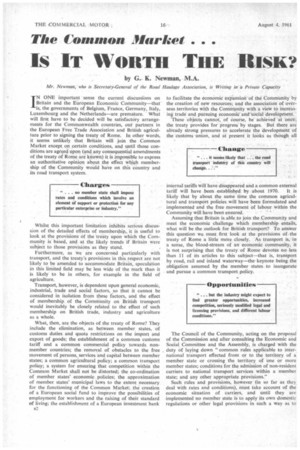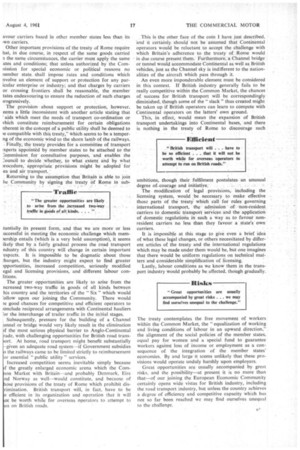Is IT WORTH THE RISK?
Page 36

Page 37

If you've noticed an error in this article please click here to report it so we can fix it.
by G., K. Newman, M.A.
Mr. Newman, who is Secretaty-General of the Road Haulage Association, is 'Writing in a Private Capacity
IN ONE important sense the current discussions on Britain and the European Economic Community—that is, the governments of Belgium, France, Germany, Italy, Luxembourg and the Netherlands—are premature. What will first have to be decided will be satisfactory arrangements for the Commonwealth countries, out partners in the European Free Trade Association and British agriculture prior to signing the treaty of Rome. In other words, it seems unlikely that Britain will join the Common Market except on certain conditions, and until those conditions are agreed upon (and any consequential amendments of the treaty of Rome are known) it is impossible to express an authoritative opinion about the effect which membership of the Community would have on this country and its road transport system.
Whilst this important limitation inhibits serious discussion of the detailed effects of membership,. it is useful to look at the provisions of the treaty upon which the Community is based, and at the likely trends if Britain were subject to those provisions as they stand.
Furthermore, as we are concerned particularly with transport, and the treaty's provisions in this respect are not likely to be amended to accommodate Britain, speculation in this limited field may be less wide of the mark than it is likely to be in others, for example in the field of agriculture.
Transport, however, is dependent upon general economic, industrial, trade and social factors, so that it cannot be considered in isolation from these factors, and the effect of membership of the Community on British transport would inevitably be closely related to the effect of such membership on British trade, industry and agriculture as a whole.
What, then, are the objects of the treaty of Rome? They include the elimination, as between member states, of customs duties and quota restrictions on the import and export of goods; the establishment of a common customs tariff and a common commercial policy towards nonmember countries; the removal of obstacles to the free movement of persons, services and capital between member states; a common agricultural policy; a common transport policy; a system for ensuring that competition within the Common Market shall not be distorted; the co-ordination of member states' economic policies; the approximation of member states' municipal laws to the extent necessary for the functioning of the Common Market; the creation of a European social fund to improve the possibilities of employment for workers and the raising of their standard of living; the establishment of a European investment bank s2
to facilitate the economic expansion of the Commimity by the creation of new resources; and the association of overseas territories with the Community with a view to increasing trade and pursuing economic arid -social developMent.
These objects cannot, of Course, be achieved at once; the treaty provides for progress' by stages. But there are already strong pressures to accelerate the development of the custams union, and at present it looks as though all The Council of the Community, acting on the proposal of the Commission and after consulting the Economic and Social Committee and the Assembly, is charged with the duty of laying down "common rules applicable to international transport effected from or to the territory of a member state or crossing the territory of one or more member states; conditions for the admission of non-resident carriers to national transport services within a member state; and any other appropriate provisions."
Such rules and provisions, however (in so far as they deal with rates and conditions), must take account of the economic situation of carriers, and until they are implemented no member state is to apply its own domestic regulations or other legal provisions in such a way as to avour carriers bascd in other member states Tess than its ,wn carriers.
Other important provisions of the treaty of Rome require hat, in due course, in respect of the same goods carried 3 the same circumstances, the carrier must apply the same ates and conditions; that unless authorized by the Cornfission for special economic or political reasons no nember state, shall impose rates and conditions which nvolve an element of support or protection for any paricular enterprise or industry; and that charges by carriers or crossing frontiers shall be reasonable, the member tates endeavouring to ensure the reduction of such charges rrogressively.
The provision about support or protection, however. eems a little inconsistent with another article stating that aids which meet the needs of transport co-ordination or vhich constitute reimbursement for certain obligations nherent in the concept of a public utility shall be deemed to oe compatible with this treaty," which seems to be a temperng of the economic wind to the shorn lamb of the railways.
Finally, the treaty provides for a committee of transport !xperts appointed by member states to be attached to the -,:ommission for consultative purposes, and enables the :outwit to decide whether, to what extent and by what rrocedure, appropriate provisions might be adopted for ea and air transport.
Returning to the assumption that Britain is able to join he Community by signing the treaty Of Rome in sub tantially its present form, and that we are more or less uccessful in meeting the economic challenge which memmrship entails (which is a very bold assumption), it seems ikely that by a fairly gradual process the road transport ndustry of this country will change in certain important tspects. It is impossible to be dogmatic about those :hange.s, but the industry might expect to find greater )pportunities, increased competition, seriously modified egal and licensing provisions, and different labour conlitions.
The greater opportunities are likely to arise from the ncreased two-way traffic in goods of all kinds between his country and the territories of the " Six " which would 'ollow upon our joining the Community. There would good chances for competitive and efficient operators to onclude reciprocal arrangements with Continental hauliers or the interchange of trailer traffic in the initial stages.
Subsequently, pressure for the building of a Channel unnel or bridge would very likely result in the elimination f the most serious physical barrier to Anglo-Continental rade, with challenging opportunities for British road transort. At home, road transport might benefit substantially –given an adequate road system—if Government subsidies the railways came to be limited strictly to reimbursement or essential "public utility" services.
Increased competition seems inevitable simply because f the greatly enlarged economic arena which the Corn'ion Market with Britain—and probably Denmark. Eire nd Norway as well—would constitute, and because of ose provisions of the treaty of Rome which prohibit disrimination. British transport will, in fact, have to be o efficient in its organization and operation that it will ot be worth while for overseas operators to attempt to un on British roads. This is the other face of the coin 1 have just described, 'and it certainly should not be assumed that Continental operators would be reluctant to accept the challenge with which Britain's adherence to the treaty of Rome would in due course present them. Furthermore, a Channel bridge or tunnel would accommodate Continental as well as British vehicles, just as the Channel sky is indifferent to the nationalities of the aircraft which pass through it.
An even more imponderable element must be considered in this context. If British industry generally fails to be really competitive within the Common Market, the chances of success for British transport will be correspondingly diminished, though some of the " slack " thus created might be taken up if British operators can learn to compete with Continental operators on the tatters' own ground.
This, in effect, would mean the expansion of British transport undertakings into Continental bases, and there is nothing in the treaty of Rome to discourage such ambitions, though their fulfilment postulates an unusual degree of courage and initiative.
The modification of legal provisions, including the licensing system, would be necessary to make effective those parts of the treaty which call for rules governing international transport, the admission of 'non-resident carriers to domestic transport services and the application of domestic regulations in such a way as to favour nonresident carriers no less than they favour a state's own carriers.
It is impossil4e at this stage to give even a brief idea of what these legal changes, or others necessitated by different articles of the treaty and the international regulations which may be made under them would be, but one imagines that there would be uniform regulations on technical matters and considerable simplification of licensing.
Lastly, tabour conditions as we know them in the transport industry would probably be affected, though gradually.
The treaty contemplates the free movement of workers within the Common Market, the "equalization of working and living conditions of labour in an upward direction," the alignment of the social policies of the member states, equal pay for women and a special fund to guarantee workers against loss of income or employment as a consequence of the integration of the member states' economies. By and large it seems unlikely that these provisions would operate unduly harshly upon employers.
Great opportunities are usually accompanied by great risks, and the possibility—at present it is no more than that—of our joining the European Economic Community certainly opens wide vistas for British industry, including the road transport industry, but unless the country achieves a degree of efficiency and competitive capacity which has not so far been reached we may find ourselves unequal 10 the challenge.








































































































